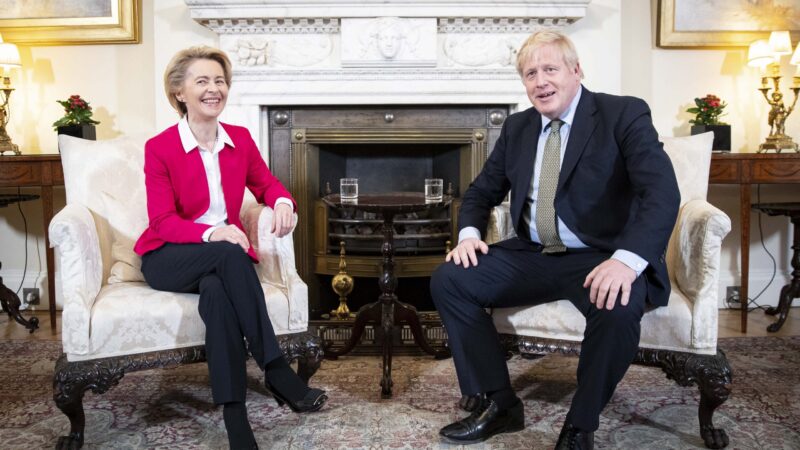When is Johnson going to meet von der Leyen? The sequence of the Brexit end game is very important

Monday 7 December at 1945, European Commission President von der Leyen tweeted out the statement that a meeting between her and Boris Johnson would take place “in the coming days”.
It is now 22 hours on from that statement (and it is only 570 hours until the end of the Brexit transition period) and we still do not know when the von der Leyen – Johnson meeting will happen. We also know that rather little has happened in Brussels today on the trade deal front, although the news that the Joint Committee had concluded and the UK will drop the offending clauses of the Internal Market Bill and Finance Bill did come in the early afternoon.
Why does the absence of a confirmed meeting time matter, other than that overall time is short?
Because the order in which things happen in Brexit matters.
And – on Thursday afternoon and Friday morning this week – the Heads of State and Government of the 27 EU Member States are meeting at a European Council. And the timetable for that cannot be moved.
The question then becomes: does the Johnson – von der Leyen meeting take place before the European Council, during the European Council, or after the European Council. Or, perhaps more interesting still, does Johnson try to muscle in on the Council itself? We know that Merkel and Macron do not want the European Council to be devoted to Brexit, but that’s not to say Johnson is not giving that a try.
Let’s look at the different models.
The meeting before the European Council route would be billed as Johnson seeking to strike a Deal with von der Leyen, and then that Deal being rubber stamped by the European Council. The problem of course with this option would be that the two sides are known to be far apart on the three outstanding issues – fisheries, Level Playing Field, and Governance – and Johnson may have emerged empty handed, outwitted in Brussels by a bureaucrat who did not bend to his will.
The opposite – for the meeting to happen after the European Council – might superficially suit the UK side better. Theoretically von der Leyen (and indeed Barnier) could use the interim period to ponder their positions, a discussion at the European Council could even give von der Leyen more leeway to compromise, and Friday both sides strike the Deal. This one looks to be a very high stakes gamble, but would be fitting with the way the UK has played this all along – Number 10 assumes the other side will panic first.
Attempting something during the European Council – or even to try to allow Johnson to make his case directly to Heads of State and Government – should not be discounted either. Johnson likes to think he has a great power of persuasion, but around the table would be 27 people with whom he has scant little rapport. And even meeting von der Leyen concurrent to the European Council would not be a clever tactical play – because the EU has plenty of other things on its plate as well as Brexit.
It is also worth pondering why Johnson agreed to meet von der Leyen in the first place, and indeed how concrete the agreement to meet even was in the call. After two phone calls that led to scant little progress, I presume it was Johnson’s idea to try to meet face to face – and then von der Leyen agreed to that, saying OK, it better be in Brussels then. And I assume there was no timeframe agreed for the talks, because the EU side – possibly incorrectly – assumed that the offer to want to talk from the UK side meant there was a determination to make progress, that might not actually have been the case. There was also the peculiarity that the call yesterday between the two was paused, was meant to resume, but never did resume – could it be that the latter part was meant to sort out this scheduling, and it never happened?
All of this has to also be set against the timetables on both sides – the European Parliament does not want to be bounced into agreeing a Deal, and time is already ridiculously short – and the UK side knows this. The timetable on the UK side – where parliamentary scrutiny does not seem to matter as much and everything could be tied up in a couple of days – is more flexible.
Having tried the tactic of running down the clock to (so far unsuccessfully) extract concessions in the negotiations, it looks to me that the UK side is trying the same tactic again – yet this time using the scheduling of the Johnson-von der Leyen meeting as the tool.
Unless we hear very soon when this meeting is to take place, the No Deal alarm bells ought to start ringing very loud once more.
Dear Jon,
After the EU left the world-beating UK Single Market and Customs Union, we all are seeing live how His Majesty’s Boris is blundering over this last-ditch opportunity to finally die in a ditch, as he promised “urbi et orbi” in September 2019.
New news on this by next Sunday afternoon. Don’t miss it!!
Yours,
Fernando Ferreira
Boris has broken his self-inflicted deadlines several times. EU has seen this.
No deal maximizes perceived political sovereignty. This delivers on their elected mandate. The majority in Parliament emboldens Johnson. There seems to be consensus in the Cabinet. I have a feeling No Deal was actually their objective.